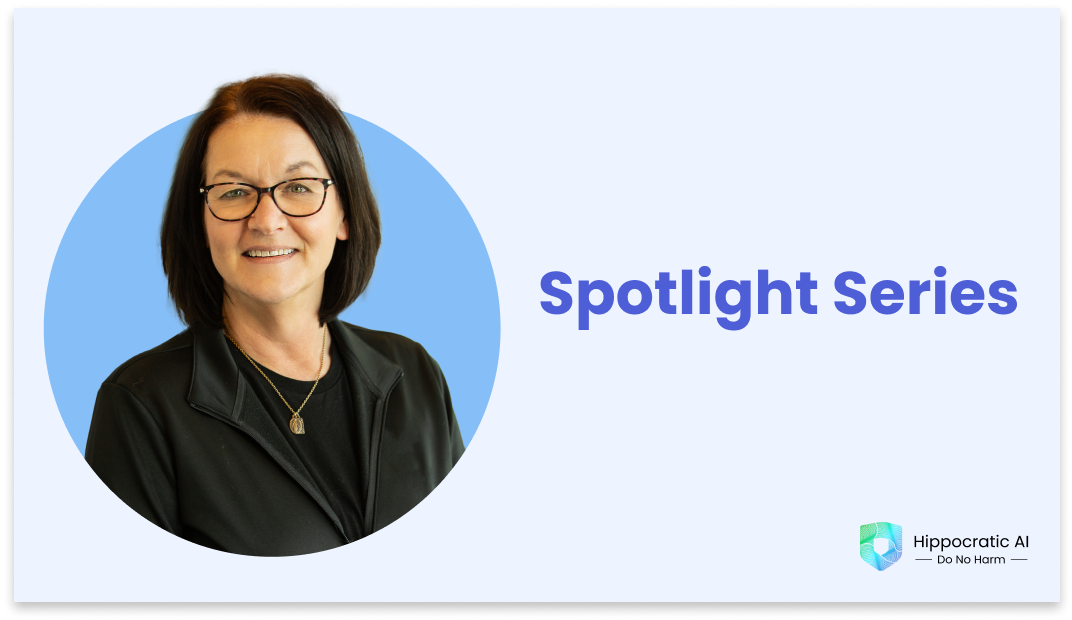The Hippocratic AI Spotlight Series features in-depth interviews with the key team members who are propelling our mission to deliver healthcare abundance on a global scale. Our cross-disciplinary team—spanning clinical, research, engineering, and product expertise—ensures a diverse range of perspectives and insights. Their leadership reinforces our commitment to safety through our Polaris constellation LLM architecture.
Michelle Voisard RN, BSN, CCM is Hippocratic AI’s Director of Care Management. She is one of the leading voices of the importance of empathy in our AI agents when interacting with patients. We asked Michelle about her journey to becoming Director and how her past experiences have provided the insights to ensure we provide compassion and care for every patient interaction.
Can you introduce yourself and give us your background?
My name is Michelle Voisard, and I have over 15 years of experience in nursing. I began my career in orthopedics and inpatient rehabilitation, before transitioning to Humana. For the majority of my tenure there, I led teams of care managers, providing support to patients with chronic diseases and those transitioning from hospital to home care. I also taught motivational interviewing to hundreds of care managers, a method I firmly believe in for its compassionate approach to assisting patients in achieving their health goals.
Based on your background, what were your initial thoughts on the application of how our AI agents can be used?
Early on, I was really excited about the potential to help patients more proactively. I was constantly calling very sick patients who needed check-ins, but I always wished we could reach out to people earlier in their health journey to prevent them from becoming so ill. The challenge was clear, there weren’t enough staff to cover all the patients who could benefit from early intervention. I saw our AI agents as a way to connect with patients who might otherwise never receive a call—reaching out early, offering advice, and referring them to other programs or clinicians when needed.
Can you tell us about what you have been most surprised about our AI agent interactions?
The unlimited patience that our AI agents have. So many patients know it’s an AI calling. Even though patients know they’re interacting with an AI, many open up about their lives—they talk about their families, pets, and even their physical discomforts. Some conversations go on for a long time, which was initially shocking to me. However, I now see that this unhurried, empathetic interaction is exactly what many patients need. Additionally, I’m proud of our focus on safety. Those two together are a nice little combination for patients to make them feel cared for and listened to.
What advice would you give to others who want to grow into leadership roles or join a company with a strong, values-driven mission?
Stepping out of your comfort zone can be transformative. I took a significant leap by joining Hippocratic AI because I deeply believed in our mission and safety message, even though I loved my previous role. My husband and I had many long conversations about whether this move was too risky, but ultimately, I felt that I could make a bigger impact on more people by taking that chance. My advice is to trust your instincts and be willing to embrace change when it aligns with your values and goals.
Are there any personal experiences that have shaped your perspective on AI in healthcare?
Over the past year and a half, both my parents—retired teachers who’ve always been incredibly active and healthy—faced some serious health challenges. Last year, my dad ended up in the hospital, and things looked pretty grim. On the day he was set to be discharged, while he was sitting on the side of his bed, he started asking all these questions, wondering what if nothing worked out. Even though he’s the type who usually brushes off calls, I suggested we test out our AI agent, Rachel. To my surprise, he dove right in, asking her insightful questions, and I could literally see him relax as she provided reassuring, empathetic answers. It was a moment where I had to hold back tears—here I was, with all my experience, but I was juggling work and family, and yet the AI was offering comfort and clarity in a way I couldn’t at that moment. It really drove home the point: this product isn’t just for patients—it’s for everyone who needs a little extra care and understanding.
Any lasting commentary that you want to provide?
Looking back, it’s incredible to think that just a few years ago, the idea of AI in patient care wasn’t in our vocabulary. Today, it’s making a tangible impact—helping patients feel heard and supported, and even assisting healthcare professionals along the way. I’m excited about the future, knowing that by providing compassionate interactions, we’re truly transforming the way we are able to support better patient outcomes.

